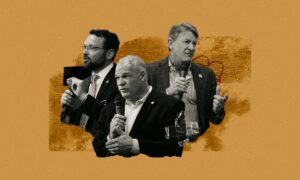Updated: Sep 19, 2020
Commission Receives Briefing From Respected Cadre of Members of Congress,
Former Elected Officials, and Economists
CHATTANOOGA, Tenn. – The Millennial Debt Foundation (MDF) on Tuesday held the inaugural meeting of the Millennial Debt Commission. The group, which includes 16 of the top millennial business leaders in the nation, received briefings from a respected cadre of members of Congress, former elected officials, and economists.
- Former Congressional Budget Office (CBO) Director Doug Holtz-Eakin predicted that necessary measures to save the economy will cause deficit spending to reach $5 trillion before year end. Holtz-Eakin went on to say that the national debt is “quite literally mathematically unsustainable” and that we are headed “into a death spiral.”
- U.S. Senate Intelligence Committee Acting Chairman Marco Rubio (R-Fla.) said he sees electronic or non-traditional currency as a greater threat than the yuan to U.S. reserve currency status and likened the national debt to a pandemic based on the need to prepare for the unexpected. The debt “requires you to take steps today to prevent something down the road that no one can see that you keep hearing about,” he said.
- U.S. Senator Ron Johnson (R-Wis.), who first ran for the Senate on a platform of limiting the growth of government and reducing government spending, called the growing deficit “inter-generational theft” since it will burden future generations with paying the price for decisions being made today.
- Millennial U.S. Congressman William Timmons (R-S.C.) pointed to the U.S. House Select Committee on the Modernization of Congress for a potential breakthrough on budget process reform.
- Former U.S. Senator Bob Corker (R-Tenn.) said he thinks it is time for “the younger generation to take the mantle” on debt and deficit spending.
- MDF Founder Weston Wamp said trillion dollar deficits are an experiment being conducted by leaders who won’t be around to face the consequences.
Key excerpts of the commission meeting follow. Video of the full meeting is available upon request. A condensed video of the meeting will be available later this week.
Weston Wamp, Founder of the Millennial Debt Foundation
“The national debt has for so long in Washington been talked about as an injustice or an unfairness to our children and grandchildren… But the reality, and I think what makes what we’re doing patently different, is that the children and grandchildren that politicians were talking about in 2005 or 2010 or 2015, they are millennials. They are serving in the U.S. Congress now. They’re running some of America’s great businesses, like all of you are.”
“…If this moment feels big and you feel like you’ve been asked into a conversation and a mission that just seems so enormous that it is overwhelming, I would remind you that over the 250 year history of our country, every significant movement, in fact, virtually every significant policy change, started with citizens stepping forward and often political leaders following them.”
“It’s important that we begin to show leadership on this issue because I’m convinced that our generation is the first that will confront the consequences of what I refer to as an extraordinary and unprecedented experiment in deficit spending that America has entered over the last 20 years… What we know as a fact, though, is that the experiment was set into motion – or more or less conducted – by a lot of people in Washington who will not be around to see what those consequences are – and we all will be. And that is at the heart of why I think it’s important, and I am so grateful that all of you have joined this unique purpose of bringing millennial business leaders together with millennial political leaders to have a conversation about generational stewardship.”
U.S. Representative Mike Gallagher (R-Wis.), Honorary Congressional Advisor
“What you don’t see on the TV is the fact that there is that next generation coming up – people that have served in the military, in the intelligence community, that have had successful private sector careers but are still young enough where they really feel like they can change the conversation in D.C. And I can’t think of a more serious problem to tackle than that of our national debt… In fact, we’ve gotten to a point where there’s now a mainstream economic theory, modern monetary theory, that just says our debt doesn’t really matter. It’s almost as if when faced with a seemingly insurmountable challenge that is our debt, many of our fellow citizens have chosen to wish the problem away instead of tackling it head on.”
“We had a saying when I was in the military that problems don’t age well, and that saying definitely applies to our debt problem today. The longer we wait, the tougher this is going to be to fix. And for some reason, despite the noble efforts of great Americans like the late Senator Tom Coburn and others who have written and spoken and dedicated their lives to fixing parts of this problem, the people in power in both parties have often chosen to ignore the debt, maybe because they never figured it would be a problem in their lifetimes. But as millennials, I just would say, we don’t have that luxury.”
“I believe this is really an existential issue for our country. And with the coronavirus, we’ve seen that if we do not act to control the debt in good times, the problem is only going to compound in bad times.”
Doug Holtz-Eakin, Former Director of the Congress Budget Office; President of the American Action Forum; Senior Advisor to the Commission
“I want to congratulate you for standing up this commission and thank everyone who is on this call. This issue is central to our future. There’s no doubt about it. And the previous generations have not done the job. And so it has fallen to you. I apologize on behalf of those previous generations.”
“As a result [of the pandemic], the Federal Reserve had a $3 trillion increase in its balance sheet and the Congress has responded quickly and on a very large scale to try to support the economy and get the American public through this. I think they should be nothing but congratulated for doing something that they do really well, which is spend money. This is the time to have done that, and they have. The deficit is going to be very large this year – over $4 trillion, probably $5 trillion before we’re done.”
“…As far as the eye can see, the projected spending outstrips projected revenues and the lines diverge. And as a result, the national debt, whether in absolute terms or relative to GDP, continues to rise and rises inexorably with no limit. And that is simply unacceptable and quite literally mathematically unsustainable. We are heading mechanically into a death spiral where we borrow to pay interest on previous borrowing, and it cannot be sustained.”
U.S. Senator Joni Ernst (R-Iowa), Honorary Congressional Advisor
“We do have a moral obligation to get our house in order, folks. I truly believe that. I was on the budget and appropriations process reform committee, the joint select committee that was established several years ago. I really appreciated the opportunity to be on that committee and work in a bipartisan way towards solutions, real meaningful solutions. And at the end of the day, we couldn’t come together on legislation. We could not do anything more than just simple window dressing, which didn’t take care of our problems at all. There are so many people stuck in the way that we’ve always done things is the way we’re going to continue to do things. And we really do have to move beyond that.”
U.S. Senator Ron Johnson (R-Wis.), Honorary Congressional Advisor
“First and foremost, I think everything should be on budget. I think every dollar of federal spending should be voted on every year. The fact that we have more than 70 percent of our budget now on complete automatic pilot is one of the big problems. I’m not saying that’s going to be the cure all, but if members actually had to vote on over $4 trillion of spending every year, it just might make an impact.”
“I’m a big supporter of a two year budget cycle. You have this massive government, you really do. It’d be nice to have a two year budget cycle where you pass half of the appropriations bills in one year while you were doing oversight over the other half that you’d pass the previous year. I think that’d be a good structural change.”
U.S. Senator Marco Rubio (R-Fla.), Honorary Congressional Advisor
“This is such a difficult issue that it requires, sort of, high level leadership on it – meaning it’s hard to do without the White House on board. Clearly the Obama administration was not very interested in doing it. And the Trump administration hasn’t really focused on debt as a main issue that they want to prioritize. But some administration down the road will have to. My biggest fear is that they will have to do so not as a forward thinking policy move but as a crisis move, and crisis is always more disruptive than forward thinking. So my hope is that we’ll continue to talk about it and at some point it will become a priority that has a chance of passing.”
“Where I do think you could see a threat is in electronic currencies. You know, non-national currencies that could eventually emerge with enough participation to be a challenge to our global reserve status. We benefit greatly, directly and indirectly, from our global reserve status. And a lot of it is based on the tremendous amount of confidence and goodwill built over 140 years of economic performance, but it is not the kind of thing that we can take for granted, especially in a rapidly evolving world… And my sense is rather that perhaps the biggest threat in the long term is not some national currency, but some non-national currency… that could potentially threaten our reserve status. We’re a long ways from it, but at the end of the day, we’re living in a time of rapid change, and I don’t think we should be taking any of these things for granted.”
U.S. Representative William Timmons (R-S.C.), Honorary Congressional Advisor
“We can’t pinch pennies right now. We’ve got to get our economy back on track. We’ve got to overcome COVID, but next Congress, we have to have serious conversations about what is an appropriate amount of debt and how we are going to stop the deficit spending and then how we are going to start chipping away to reduce our debt from what I think could be $30 trillion next year – and that’s unacceptable.”
“The global economy is not going to allow the United States government to borrow $70 trillion. It’s just not. And there will be conversations of our peers and near peers of what can be done, whether it’s a basket of currency, whether it is China actually getting credibility in the global economy somehow and giving an alternative. If we have $50, $60, $70 trillion in debt, we will lose our preeminent position and the dollar will just be in the trash can. And so that is the number one thing that’s saving us because right now there’s no alternative… but the second that there is an alternative, the house of cards will fall.”
“The budgetary process is critical to this conversation. The Select Committee for the Modernization of Congress is actually working on that. I’m on that committee. I’m very fortunate to be on there, and we will be promulgating budget reform recommendations here in the next few months.”
U.S. Representative Bryan Steil (R-Wis.), Honorary Congressional Advisor
“I think the most telling statistic is your debt to GDP ratio… We came into the end of last year and our debt to GDP ratio was around 79%. Call it 80% to keep math simple. This year, we’re obviously in a recessionary environment plus we’ve dramatically increased traditional spending, and so the projected Congressional Budget Office (CBO) debt to GDP ratio at the end of the year is 101%. That’s really the tipping point when you talk to macroeconomists and where you get into a danger zone. There are two things that are going to occur, I think, next year that will bring some level of stability back to that. One, we should see economic growth begin to increase again. And we should, hopefully, we are going to need to pull back the reins on federal government spending. What we need to do is have an adult and thoughtful conversation about how we are going to turn the tide and get back to a sustainable path going forward.”
Former U.S. Senator Jim DeMint, Chairman of the Conservative Partnership Institute; Senior Advisor to the Commission
“I think common sense tells all of us that you can’t keep spending more than you’re bringing in without something bad eventually happening. And I think that’s where we are starting. And I think the situation now is really even worse than it was a decade ago because now not only are we spending a lot more than we’re bringing in, the debt we’re creating is not being sold to state pension funds and to other countries. The large majority of it is just being bought in effect by the Federal Reserve. And they don’t have money except what they print. And so the expansion of the money supply is a whole new dynamic in this thing that should be a concern.”
“We’re not going to make any progress unless there is a balanced budget requirement for Congress. Unlike states, who get together every year, they have to consider what they want to do and what they have to take away. They have to balance their budget, even if they do it with more debt. In Washington, there’s no need to set priorities because I can give the Democrats what they want and Republicans what they want and we go ahead. Unless we have a real institutional requirement to balance the budget, we’re going to run this country in a hole. And we don’t have to make dramatic cuts in order to make that work.”
Former U.S. Senator Bob Corker
“For me to see young people like you and others who are on this call trying to tackle what to me is still ultimately going to be one of the biggest issues our nation has to solve is heartwarming. And so I want to thank you. I want to thank the business leaders, the political leaders who have been involved in this issue. I think it’s time that the younger generation takes this mantle on. You’re creating the leadership for that and creating the fulcrum for that, and I want to thank you for doing so.”
“It’s very difficult when it feels as benign as it does right now to really raise an awareness and to cause action to take place. And that’s your challenge, but I applaud you for beginning now. There will come a time when people will thank you and others on this call for addressing this issue early on and creating the foundation for us to deal with this in a sensible way.”
About the Millennial Debt Foundation
The Millennial Debt Foundation was created in mid-2019 to lead a generational conversation about fiscal stewardship, the role of the federal government and America’s deficit spending crisis. Inspired by the work of its early supporter, former U.S. Senator Tom Coburn, M.D., the foundation’s first major project is the Millennial Debt Commission. The commission is made up of 16 millennial business leaders from across the country working toward a framework for long-term deficit reduction. The Millennial Debt Foundation is a Tennessee-based 501(c)(3) funded by private donors and the Lynde and Harry Bradley Foundation.
About Millennial Debt Foundation Founder Weston Wamp
A member of the Tennessee Board of Regents and a former early stage investor, Weston currently serves as the senior political strategist for Issue One, a national nonpartisan reform organization. As a 27-year-old in 2014, Weston came within a percentage point of being elected to the U.S. Congress. After returning to the private sector and raising one of the best known venture capital funds in the South, Weston returned to politics focused on two issues: generational leadership on the national debt and restoring confidence in Congress through bipartisan reform. Weston lives in Chattanooga, Tennessee with his wife, Shelby, and their three children, River, Griffin and Aldridge.



